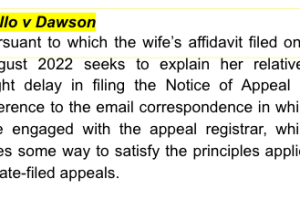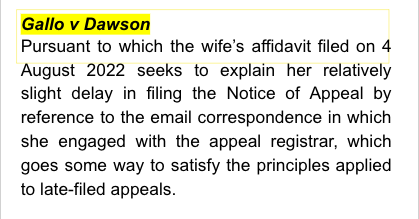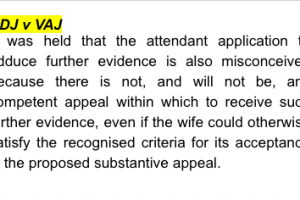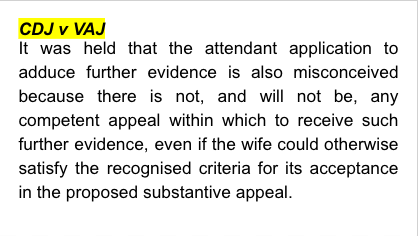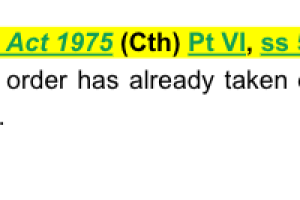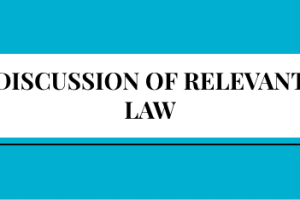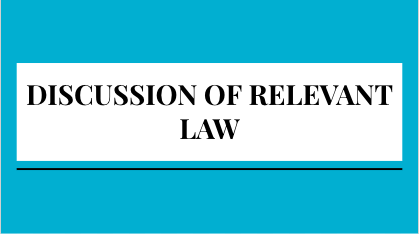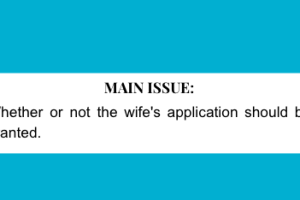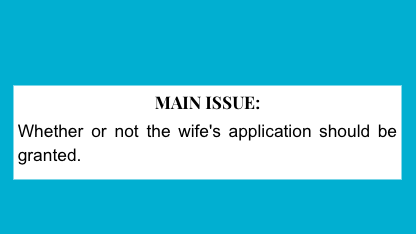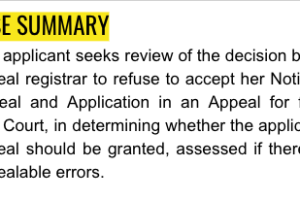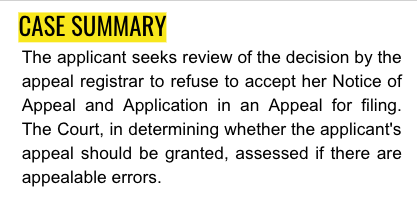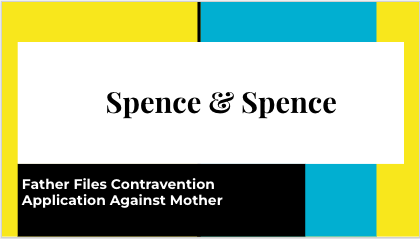- · 4780 friends
Wife Seeks Review of Registrar's Decision

Spence & Spence [2022] FedCFamC1A 127 (16 August 2022)

The applicant seeks review of the decision by the appeal registrar to refuse to accept her Notice of Appeal and Application in an Appeal for filing. The Court, in determining whether the applicant's appeal should be granted, assessed if there are appealable errors.

Facts:
On 21 June 2022, a judge of the Federal Circuit and Family Court of Australia (Division 2) made orders in these terms: "Upon the application of [the husband] for a divorce order in relation to the marriage between [the husband] and [the wife] which was solemnised on the 10th day of October 2015, THE COURT FINDS THAT: (a) the marriage is proved; (b) the Husband was at all material times an Australian citizen and domiciled in Australia; and (c) the ground for the Application for Divorce order, namely that the marriage has broken down irretrievably is proved. A divorce order be made, such divorce to take effect and thereby terminate the marriage on the 23 July 2022. The Wife’s response to Divorce filed on 17 October 2021 be dismissed."
The Court declared that there are no children of the marriage to whom section 55A(3) of the Family Law Act 1975 (Cth) applies. The wife prepared an undated Notice of Appeal, which she unsuccessfully tried to file on 18 July 2022. The Notice of Appeal was rejected for these reasons: (a) neither the filing fee was paid nor was any exemption form provided; (b) the appealed orders were not annexed to the Notice of Appeal; (c) the Notice of Appeal purports to appeal from various paragraphs of the reasons for judgment; not from any of the four orders which embody the Court’s judgment; and (d) the “Grounds of appeal” annexed to the Notice of Appeal comprise a lengthy narrative which does not discretely identify any alleged appealable errors and, additionally, refers to evidence which was not apparently adduced before the primary judge.
The wife was reminded that, should she wish to revise and file the intended appeal, she would have to do so before the time for filing expired at 4.30 pm that same day, when the limitation period for the appeal expired. The appeal registrar also reminded the wife that the divorce order would take effect and dissolve the marriage, so haste was important. Two days later, on 21 July 2022, by which time the limitation period for any appeal had expired, the wife emailed the appeal registrar seeking to file an “attached affidavit and application in a proceeding”. The wife sought to extend the due date of the file of Notice of Appeal.
The appeal registrar replied that the attached documents were not accepted for filing because: (a) her affidavit contained no evidence at all about why the proposed appeal was being brought late; (b) the proposed appeal was pleaded in much the same terms as that which had already been rejected; and (c) there was no basis upon which further evidence could be received until after it had been first determined whether she could bring the proposed appeal out of time.
On 1 August 2022, the wife filed an Application in an Appeal seeking the review of the appeal registrar’s decisions on 19 July 2022 (to reject the wife’s Notice of Appeal) and 22 July 2022 (to reject the wife’s affidavit and annexed Application in an Appeal).

Issue:
Whether or not the wife's application should be granted.

Applicable law:
Family Law Act 1975 (Cth) Pt VI, ss 55, 60 - pursuant to which the divorce order has already taken effect as an order in rem.

CDJ v VAJ (1998) 197 CLR 182; [1998] HCA 67 - pursuant to which it was held that the attendant application to adduce further evidence is also misconceived because there is not, and will not be, any competent appeal within which to receive such further evidence, even if the wife could otherwise satisfy the recognised criteria for its acceptance in the proposed substantive appeal.


Analysis:
The wife professes her continuing love for the husband, with which sentiment one can readily empathise, but her only apparent grievance with the judgment is that the parties were still using a joint bank account and a joint credit card after the date upon which the husband contended the parties had finally separated. Even so, such continuing financial connections could neither preclude, nor render false, the finding made by the primary judge about the passage of the requisite period of separation and the irretrievable breakdown of the marriage under Pt VI of the Act.
Such financial connections between the parties have since ceased anyway, as the wife admits. If the Notice of Appeal had been accepted and filed within time, its summary dismissal would have inevitably followed for lack of any reasonable prospect of success.
The proposed appeal, if brought out of time, is bound to fail in the form it is pleaded. In the event of the review application, the husband sought an order that the wife pay his legal costs of the review hearing in the sum of $20,038.42.
The review application was indeed wholly unsuccessful, but the wife has only modest financial circumstances. She is employed and has an encumbered home. The husband’s written submissions in opposition to the review application comprise only five paragraphs.
Conclusion:
The review application must fail. The cost application is refused.


